OPEC (Organization of the Petroleum Exporting Countries) and its allies (OPEC+) have decided to extend their production cuts by 2.2 million barrels per day (b/d) until September, before gradually reducing them from October onwards. This decision comes as the price of crude oil plummeted from $80.18 a barrel at the end of May to $76.05 at the beginning of June, its lowest level since January.
Price Fluctuations and Market Reactions
Despite the reduction in global supply, crude oil prices have fallen, which could paradoxically stimulate demand for crude carriers, particularly VLCCs (Very Large Crude Carriers). Analysts at BRS Shipbrokers forecast an increase in demand for these tankers in the fourth quarter, particularly in Asia. However, this increase could be marginal. A more substantial increase in OPEC+ production would be needed to really boost this market segment in 2025, according to the same analysts.
Impact of OPEC+ Decisions on the Long Term
The gradual increase inOPEC+ production by almost 2.5 million b/d between October 2024 and September 2025 could see oil prices fall to as low as $60 a barrel next year. Jim Burkhard of Commodity Insights believes that although this fall is not the base scenario, it remains possible. Brent crude futures for August are valued at $77.58 a barrel, falling to $76.78 in November, according to Platts.
Non-OPEC+ sources of growth
Production growth in non-OPEC producers such as the USA, Canada and Guyana could offset the reduction in OPEC+ supply, increasing long-term exports to Asia and boosting freight rates. Since the start of the second quarter of 2024, requests for crude loadings on VLCCs in the Atlantic Basin have exceeded 70 per month, a sign of the growing contribution of non-OPEC producers to global supply.
Growing demand in Asia and the role of China
In April and May, around half of VLCC shipments were destined for China, indicating strong demand from Chinese refiners after the spring maintenance season. The 120-day round trip from the Atlantic Basin to China generates substantial demand for VLCCs.
Influence of refining activities in West Africa
Increased refining activity in West Africa, notably at the Dangote refinery in Nigeria, is creating new trade routes. Dangote has secured 300,000 b/d of crude from NNPC (Nigerian National Petroleum Corporation) and plans to supplement this with other light grades, including imports from the USA. Since the beginning of the year, at least four VLCCs and one Suezmax have been chartered to import American crude oil to Dangote. In May, rates on VLCC routes from the US Gulf Coast reached a three-month peak. The tariff for carrying a 270,000-ton cargo of crude on the USGC-China route increased from $8.9 million to $9.8 million in May, according to Platts. Platts valued this rate at $8.7 million in early June, against a five-year average of $7.5 million.
This dynamic shows that OPEC+ production adjustments and the response of other producers have a complex influence on global energy and shipping markets.





















